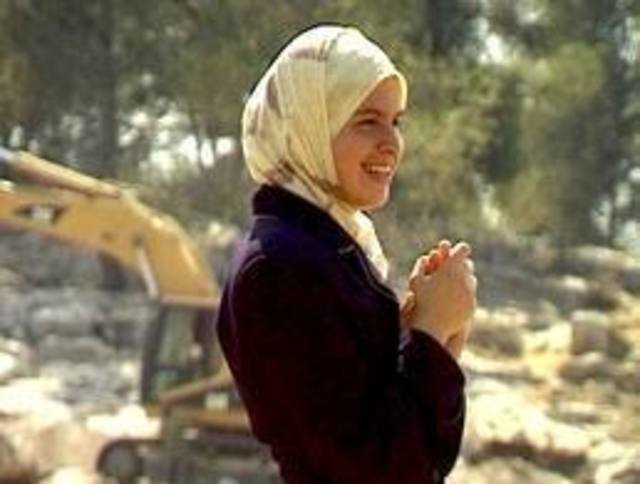Little Budrus Busts the Barrier

Ayed’s daughter Iltezam braves the bulldozers.
Here’s an unlikely holiday movie: a feel-good documentary about the Israeli-Palestinian conflict. And not just another heartwarmer about musicians or children learning to play together, but the gripping account of a showdown over a patch of territory each side deems worth killing or dying, for: a Palestinian olive grove just across the border from Israel.
Contrary to some misperceptions, the barrier fence/wall that Israel began building in 2003 to deter terror attacks doesn’t simply follow the “Green Line” between its territory and the West Bank. It snakes like a gerrymandered congressional district, deep into Palestinian territory, avowedly to block infiltration routes, allegedly to disrupt and weaken a Palestinian state.
This isn’t abstract geopolitics in the village of Budrus. The barrier will hem in it and eight other villages, loom over its school, and lop off 300 acres—the cemetery and the 8,000 olive trees that are its anchors and its mainstay. But one villager, a veteran but, it seems, disillusioned Fatah activist named Ayed Morrar, has a different idea. He doesn’t mention Gandhi or King, but he’s clearly imbibed or deduced their teachings: Nonviolent civil disobedience is the most effective weapon against otherwise insurmountable oppression, as long as the oppressor is at least somewhat susceptible to shame, embarrassment, or outside pressure. (It wouldn’t work against Hitler, as Gandhi conceded, and hasn’t against China’s, Iran’s, and Burma’s rulers.)

And so the men and youths of Budrus—even a local Hamas leader, ordinarily Morrar’s nemesis—step up to the army’s bulldozers, batons, and teargas. The women insist on joining them; Morrar’s teenaged daughter, overcoming her fear, speaks as eloquently for the cause as he does. Israeli and international peaceniks follow, complicating the soldiers’ jobs: “Because they were Jews we couldn’t use violence against them,” says Yasmine Levy, a raven-maned squad leader who enlisted in the border police because she wanted to play a “more assertive” role.
Perhaps the international character of the film crew—Palestinian, Israeli, and American, headed by Brazilian director Julia Bacha—disarmed resistance on all sides. In refreshingly frank interviews, everyone—even the slightly scary but especially frank Yasmine—emerges as sympathetic, save a hardline deputy minister seen in TV news debates.
Not to give too much away, but Budrus winds up a perfect holiday film—too pat perhaps, but moving, affirming, inducing the feeling that anything is possible, even a just peace in the Middle East.
Budrus plays at the Varsity Theatre. Nadav Greenberg of the Just Vision filmmaking team will appear at tonight’s showing (Sun, Dec 19) at 7:15pm.




